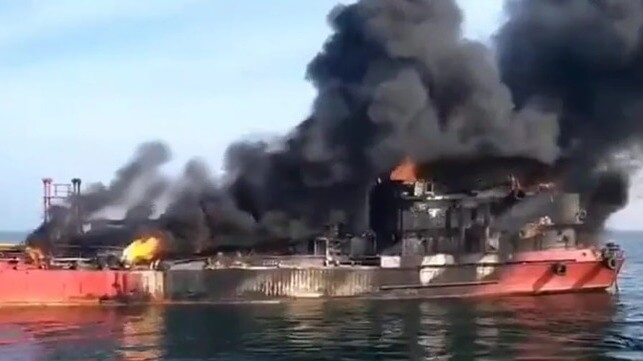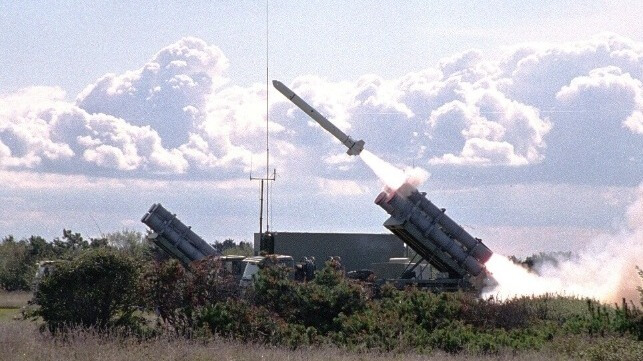Russia to Treat Ukraine-Bound Ships and Their Flag States as Combatants

The Russian government has doubled down on its threat to create "temporarily dangerous" zones for shipping in the northwestern Black Sea. In a new announcement Wednesday, the Kremlin warned that it would effectively treat Ukraine-bound ships as arms carriers - and their flag states as parties to the war.
"As of 00.00 Moscow time on 20 July, all ships proceeding in the waters of the Black Sea to Ukrainian ports will be considered as potential carriers of military cargoes," the Russian Ministry of Defense warned. "Countries of the flag of such ships will be considered to be involved in the Ukrainian conflict on the side of Kyiv regime."
The threat also specifies that areas of the southeastern Black Sea - where neutral shipping regularly transits to and from Ukraine's riverine ports - are also "temporarily dangerous." The effects on Ukrainian Danube River shipping are as yet unclear.
Wednesday's threat is more specific than Moscow's previous warnings, and it aligns with Russian actions in the early weeks of the war. Shortly after the invasion, Russian forces struck more than half a dozen foreign merchant ships, killing one Bangladeshi seafarer and destroying one product tanker. Overnight Tuesday, Russia re-emphasized its willingness to use force against civilian shipping interests by striking grain terminals in Odesa, damaging the infrastructure required for Ukrainian food exports.
Moscow withdrew from a negotiated ceasefire for grain shipping on Monday, drawing condemnation from the United Nations and the West. Ukraine held out hopes for continued cooperation with foreign-flag shipowners, even in the absence of a security arrangement; however, the Russian attack on the Port of Odesa and the direct threat against shipping would appear to reduce the odds of shipowner, insurer and flag state interest in the route.
Russia's exit from the Black Sea Grain Initiative drew a measured response from the IMO, which refrained from blaming any parties for the outcome. "I deeply regret to learn of the disruption to the Black Sea Initiative. The unimpeded flow of shipping around the globe is of critical importance and central to the work of the IMO," said outgoing Secretary-General Kitack Lim in a statement Wednesday. "The movement of ships through the Black Sea Initiative and its impact in getting food to those who need it most, as well as stabilizing world food prices, is proof that shipping must always continue to move."
Ukraine Threatens to Strike Russia-Bound Black Sea Shipping

After Russia's threat to treat all Ukraine-bound ships as possible carriers of military cargo, the government of Ukraine has responded by declaring that the Black Sea is a "danger zone" for ships heading to Russian-controlled ports. With both sides of the war now threatening to target civilian shipping, the outlook for foreign shipowners operating in the region are even more difficult than ever.
"The Kremlin has turned the Black Sea into a danger zone," warned the Ukrainian Ministry of Defense, noting that Ukraine possesses the means to conduct strikes at sea. Ukraine's navy has repeatedly used anti-ship missiles and drone attack boats to strike Russian warships, driving the Russian Navy out of the northwestern quadrant of the Black Sea - but it has never threatened to use these assets to attack civilian vessels before, not even arms-transport ships.
Beginning Friday, Ukraine plans to treat all Russia-bound ships in the Black Sea as potential carriers of military cargo, "with all the relevant risks." In addition, it has declared a ban on all navigation in the northeastern Black Sea and the Kerch Strait, an area firmly under Russian control. The busy oil export terminals at Novorossyisk, Russia are located just 50 nm southeast of the Strait.
Meanwhile, Russia appears to be acting on its own threat to make the waters off Ukraine "dangerous" for shipping, according to the U.S. National Security Council.
"Our information indicates that Russia laid additional sea mines in the approaches to Ukrainian ports," NSC spokesman Adam Hodge told media in a statement. "We believe that this is a coordinated effort to justify any attacks against civilian ships in the Black Sea and lay blame on Ukraine for these attacks."
Russia's Black Sea Fleet has several options for laying mines, including covert deployment by Kilo-class diesel-electric submarines. The attribution for a mine strike would be complicated by both sides' use of the same Soviet YaM-type moored mines.
The Russian Navy's surface vessels will have a harder time joining the effort to harass Ukraine-bound shipping, according to UK intelligence. "[Black Sea Fleet] blockade operations will be at risk from Ukrainian uncrewed surface vehicles and coastal defense cruise missiles," UK Defence Intelligence assessed.
On Monday, Moscow withdrew from a negotiated ceasefire for grain shipping on Monday, drawing condemnation from the United Nations and the West. Ukraine held out hopes for continued cooperation with foreign-flag shipowners, even in the absence of a security arrangement; however, Russian attack on the Port of Odesa and Russia's direct threat against shipping have reduced the odds of securing private sector interest.
No comments:
Post a Comment